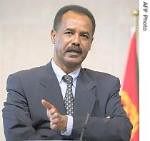
Eritrea President Isaisis Afwerki has denied involvement in the Islamic resistance movement fighting the US-backed regime in Somalia. The United Nations Security Council recently imposed sanctions against the Horn of Africa nation., a photo by Pan-African News Wire File Photos on Flickr.
Five Europeans killed in attack in remote Ethiopia
1:40pm EST
By Aaron Maasho
ADDIS ABABA (Reuters) - Gunmen killed five European tourists and kidnapped two further foreigners and two Ethiopians in northern Ethiopia's remote Afar region where separatist rebels have operated, the government said on Wednesday.
Ethiopian government spokesman Bereket Simon said two Germans, two Hungarians and an Austrian died in the dawn attack Tuesday in an arid area prone to banditry.
Wednesday afternoon, 11 tired-looking survivors still dressed in trekking clothing arrived by plane in the capital, Addis Ababa.
Several hid their faces from the awaiting television cameras. One was pushed through the airport in a wheelchair, his knees and arms bruised, before the group was taken away in diplomatic vehicles.
Ethiopia blamed its neighbor and arch-foe Eritrea for the attack, saying it had trained and armed the gunmen. Ethiopia also blamed an Afar rebel movement for kidnapping five Westerners in the region in 2007.
The incident risked raising tensions in the volatile region, as Prime Minister Meles Zenawi's government threatened "whatever action necessary to stop the activities of the Eritrean regime once and for all" if foreign powers failed to step in.
"The Ethiopian government's tolerance toward a regime that openly supports terrorist activity is inevitably wearing thinner by the day," Ethiopia's Foreign Ministry said in a statement.
It is the first time Addis Ababa has warned of action since March last year when it accused Asmara of trying to destabilize Ethiopia by backing rebels, and also supporting Islamist militants in Somalia.
Eritrea's envoy to the African Union, Girma Asmerom, rejected Ethiopia's latest allegation. "This is pathetic, an absolute lie," he told Reuters.
There was confusion over who had been hurt in the attack, and their nationalities. Addis Ababa initially said a Hungarian and an Italian had been wounded, but Rome later denied one of its citizens had been hurt.
Hungarian authorities confirmed one of their nationals was wounded. Belgium's Foreign Ministry spokesman said a Belgian and a citizen of another country who lived in Brussels had been injured and had been taken to a hospital in Mekele, northeastern Ethiopia's biggest city.
A VERITABLE LAND OF DEATH
Afar has some of the earth's harshest terrains. The highest average annual temperature ever recorded was in Afar's Danakil Depression at 34.4 Celsius (94 degrees Fahrenheit) with levels regularly exceeding 50 celsius in the summer.
Afar province's rock-strewn hills give way to vast deserts below sea level, and dry river-beds and acacia thorn-trees dot the landscape. Banditry is widespread in a region once described by the late British explorer Wilfred Thesiger as a "veritable land of death."
Foreigners who venture out into the area usually include researchers, aid workers and about 500 adventure tourists each year visiting geographical wonders such as the Danakil Depression, with ancient salt mines and volcanoes.
"The attack occurred at 5 a.m. Tuesday, in which Eritrean-trained groups also kidnapped four. Two of them are foreigners, one is a driver and the other a policeman," Bereket said.
Ethiopian state media said the victims were part of a 27-member party that included U.S. and Australian citizens.
A German Foreign Ministry spokesman said Berlin was working with its embassy in Addis Ababa to clarify what had happened.
BITTER ENEMIES
Ethiopia said the four hostages might have been taken across the frontier into Eritrea.
In 2007, gunmen seized five Europeans and eight local people in Afar. The Europeans were handed to the Eritrean authorities less than two weeks later and Britain said Asmara had helped to secure their release. The eight locals were freed a few weeks later.
Ethiopia and Eritrea fought a 1998-2000 border war that killed 70,000 people, and the dispute still festers.
Addis Ababa routinely accuses Asmara of supporting Ethiopian separatist groups, while Eritrea says the accusations are lies designed to tarnish its reputation.
"It has become a trend for Ethiopia to fabricate sensational news against Eritrea whenever the summit is nearing," Girma told Reuters, referring to an African Union summit which begins in Addis Ababa next week.
Ethiopia accused Eritrea of plotting to bomb targets and disrupt an AU meeting in January last year.
(Additional reporting by Richard Lough in Nairobi, Fredrik Dahl in Vienna, Krisztina Than in Budapest and Ben Deighton in Brussels; writing by David Clarke and Richard Lough; editing by David Stamp)
No comments:
Post a Comment